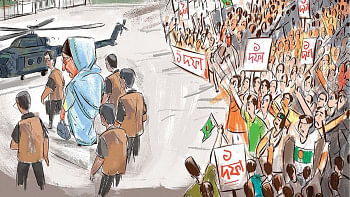Why we must build specialised research universities

"It is most difficult to get people on the path to research and publication. That culture, that appetite, that scholarly commitment has eroded considerably. [They] LOVE the microphone, they HATE the pen."
— Ahrar Ahmad
Having spent time in a leadership role in a private university in Bangladesh, I was keenly interested in the collective culture of research in the country. Interactions at both public and private universities made it apparent that the role, value and need for research are acknowledged but not well-understood. For many, it is seen mainly as a means for promotion. There is also an actively anti-research group that downplays or degrades the value of research. For this group, time is better spent in petty politics or trivial projects which add little value to either the institution or society. This aversion is reflected in the Times Higher Education rankings: not a single university from Bangladesh showed up in the Emerging Economies University Rankings 2019! None are deemed world class.
Importance of research universities
Research and use of knowledge have been fundamental to the ascendance of the western world in global importance and influence, providing immense gains from new discoveries. Given the enormous prospects of research, a recent news headline goes: China Expands Research Funding, Luring U.S. Scientists and Students.
The importance accorded to research in the advanced countries has led to the creation of a category of universities—research universities (RUs)—whose fundamental mission is problem-solving and discovering new and useful knowledge to drive change. "Nobel Prize winners routinely come from the ranks of these institutions. Professors are evaluated primarily on the papers they write and the research dollars they attract. Graduate students, who represent the number two priority at research universities, facilitate much of the research at these universities."
Vibrant and highly visible in the global knowledge infrastructure, they are immersed in challenging and rigorous work, passionately involved in discovery, pursuing new realms of knowledge as trailblazers, and engaged in a collaborative process of learning involving teacher and student.
The student-teacher model places learners in a new light—not as products or customers of the institutions, but as co-creators of knowledge. The process also incentivises the learners to be associated with new discoveries, not to mention the elating experience that follows with recognition and new opportunities.
RUs, with access to the latest resources, equipment and technology, often create new courses and curriculum and offer advanced programmes. They provide advanced education for academics, policymakers, and public and private sector professionals, preparing them for the 21st century. RUs also play a significant role in regional and national economic development. According to one source, the biotech industry was conceived and integrated into the economy almost entirely by RUs.
RUs also add to cultural vitality by helping produce strong and inclusive communities. In many countries, RUs have significantly advanced the state of medicine and healthcare. Many have teacher certification programmes to enhance pedagogical and related skills. Evidence of dramatic change is all around us, with many of these change-making innovations being conceived at top-ranked universities.
Many research-driven universities, forming research clusters in specialised knowledge arenas, are creating knowledge parks in collaboration with industry and private partners to motivate start-ups and obtain patent grants. RUs in many countries participate in community and government initiatives, providing academic expertise and technical assistance. They also provide training for workforce development. In many countries, they are major employers creating innovative work opportunities.
Properly designed and managed, RUs can transform Bangladesh society, something like in Malaysia's Ninth Development Plan which aspires: "to transform the country into a knowledge-based economy, where universities are expected to contribute significantly" (Salmi 2009). With research and local discoveries, RUs can become active participants and precursors of change, not serve as mere bystanders offering borrowed knowledge crafted in other countries.
It often creates a stir when a RU attracts distinguished scholars with strong credentials in their fields who bring the promise of high-profile projects, funding, publications, acclaim, and a growing reputation on a global scale based on their ability to produce big discoveries and scientific breakthroughs.
The prescient Bangladeshi RU
Flagship RUs must emerge in the academic landscape in Bangladesh. With their research missions, they must build strong graduate programmes that attract the best and the brightest who wish to build research/academic careers. The RUs must offer high quality master's, MPhil and PhD degrees to equip tertiary education and various other sectors of society with well-trained "research professionals" recognised for their specialised skills.
RUs have deep implications for Bangladesh to become a developed country by 2041. It requires a strong edifice of knowledge workers for a country to graduate to developed-country status. The alternative is to depend on outsiders. Without appropriate interventions and facilitating structures, along with a body of regulations (e.g., plagiarism, intellectual property protection, etc.), to foster knowledge creation and innovation, development as anticipated may be unsustainable and ephemeral.
An unfortunate fact is that the role of research in our universities has been minimised or marginalised by policies, while time devoted to teaching has been maximised. Teaching full loads (roughly around 36 credits per academic year and perhaps more) in a corporatised model of revenues and costs can cut substantially into faculty time to conduct research. The dependence on adjunct faculties is a whole other story of cost-cutting at the expense of quality education, especially research. It is thus important to consider categorising faculty into research or teaching streams. Research faculty must be given smaller teaching loads, autonomy (with accountability) and seed funding so that they can concentrate on research and seek resources to build appropriate research infrastructures.
On the larger canvas, policymaking bodies have been benign, inept, or even negligent about nurturing research potential. This must change. One is hard-pressed to find a clear vision and strategy for nurturing research in tertiary education. Part of the fault may be attributed to academia for producing low calibre research. Misappropriation of funds in the name of research is also of some concern. Conversations in academia further suggest how funding for research is dependent on who you know.
Building a meaningful and enduring research culture is an arduous process. When brought about, it could potentially launch faculty into an exciting intellectual journey, entangled in a web of evolving ideas, pushing the limits of knowledge, while addressing local challenges. In this milieu, faculty and students interact extensively, especially beyond the classroom (launching a new pedagogy). Students work with other students, critiquing, discovering, integrating, and applying their evolving knowledge structures. Partaking in international collaborative research ventures can be the icing on the cake.
For the above vision to materialise, focus ought to be on the next generation of academics (our generation has had far too many non-performers) whose mission will be to pursue exciting avenues of knowledge, primarily of relevance to the country and its aspirations. To make research central to their careers, they must be shown the many payoffs: psychological, emotional, financial, social, intellectual and reputational. As they begin to make significant contributions, the resulting self-satisfaction can be deep and enduring. Imbued with Kazi Nazrul Islam's, "Aj shrishti shukher ullashey (the rapture of creation)" they can be a truly transformative force in the nation's development and evolution.
It is time for serious discussion on what is desirable and what is possible in the realm of nurturing RUs in Bangladesh. Many Bangladeshi-born researchers, our pride, occupy prestigious positions in the global knowledge architecture. The stellar accomplishments of M Zahid Hassan, a physicist involved with the discovery of a massless particle (the Weyl fermion), provide evidence for us to say: "Yes, we can!"
Syed Saad Andaleeb is the editor of the Journal of Bangladesh Studies, serves as the Vice Chair of the Foundation for Learning Teaching and Research (fltr.org.bd), is a former Vice Chancellor, and was President of Bangladesh Development Initiative (www.bdiusa.org) for eight years.

 For all latest news, follow The Daily Star's Google News channel.
For all latest news, follow The Daily Star's Google News channel. 



Comments